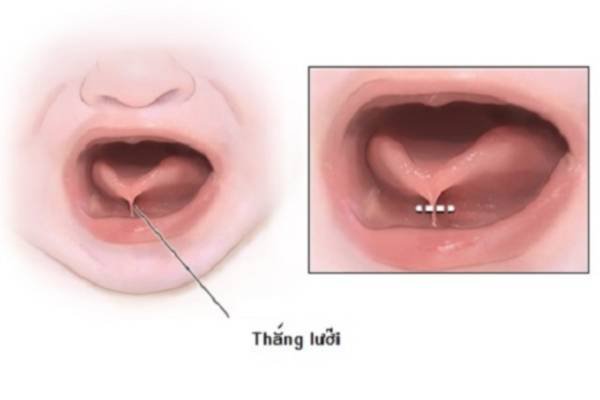Tongue adhesions in infants
Tongue adhesions are mild birth defects caused by too short, too thick or too tight adhesions that interfere with the normal movement of the tongue. In most cases of mild adhesions, the tip of the tongue will gradually separate on its own. For others, surgery may be indicated, which is just a quick minor surgery, the baby can feed and eat right after.
1. Is tongue-tie in babies normal?
Tongue adhesions in infants are not uncommon. If the skin that connects the baby's tongue under the tongue (the membrane called the fascia) is short or extends too far in front of the tongue, he or she will have a condition called ankyloglossia, also known as tongue adhesions. About 4% of children are born with this defect. There are several degrees of stickiness of the blade wire, depending on how close the blade tip is to which the wire is wound. Some babies are able to latch on a little more than usual, while others have a membrane attached to the tip of their tongue. The tongue may have a heart-shaped edge because the speculum is pulling the center of the tongue back.
2. Will the tongue brake cause any problems?
Tongue adhesion can be a problem for some children. Many cases of tongue-tie can self-correct within the first six weeks of life as the structure of the mouth changes, and some children learn to self-regulate the tongue-brain position. But due to the nature of the tongue brake, it will limit the range of motion of the tongue. As a result, the condition can cause problems for babies with sucking, swallowing, and licking.

Hình ảnh dính thắng lưỡi ở trẻ nhỏ
3. Does a baby's tongue tie interfere with breastfeeding?
Sticking to the tongue can interfere with the breastfeeding process. Sometimes babies may not have a problem, but other times they may have trouble moving their tongue in the oscillating motions needed for effective breastfeeding. Breastfeeding from a bottle doesn't need to be the same, so your baby can feed normally. There are exceptions, however, in some babies with tongue-tie and even having difficulty with bottle-feeding.
Other factors that also cause difficulty suckling in babies such as the shape of the breast, the size of the nipple and the elasticity of the breast tissue can also affect the baby's ability to suck with the tongue position.
Here are some signs that your baby has a tongue tie that is making it difficult to suckle:
The baby constantly stops sucking while feeding; Babies make noises when feeding; Children gain weight too slowly; You have sore nipples while breastfeeding. (The baby may be chewing rather than suckling in an attempt to reach the milk); Your milk supply is running out.
4. Can the tongue brake be fixed?
Tongue adhesions can easily be remedied with a simple, safe, and immediately effective surgical procedure known as laryngectomy. The doctor numbs the membrane with a local anesthetic, then cuts it with a pair of scissors. The process only takes a second and it's less traumatic. Some parents reported that their baby didn't even cry during the procedure and the discomfort seemed to be minimal.
If you are concerned about your baby having a tongue tie, talk to your doctor about it. If it interferes with your baby's suckling, ask for it to be cut. If you can see your baby's tongue stuck, tell the doctor even if your baby is feeding well. Your doctor can help you decide if it's severe enough to interfere with voice development or cause other problems later on. Pediatric dentists can consider whether the condition is affecting the development of your baby's mouth or teeth.
When a child shows abnormal signs of health, parents can take the child to Vinmec Health system for timely examination and treatment.

Cha mẹ nên đưa trẻ đến gặp bác sĩ chuyên khoa để được tư vấn và điều trị kịp thời
As a key area of Vinmec Health System, Pediatrics Department - Vinmec International General Hospital always brings satisfaction to customers and is highly appreciated by industry experts thanks to the following advantages:
gathers a team of leading doctors and doctors in Pediatrics: including leading experts, with high professional qualifications (professors, associate professors, doctorates, masters), experienced, having worked in different hospitals. big hospitals like Bach Mai, 108.. The doctors are all well-trained, professional, have a heart - reach, understand young psychology. In addition to domestic pediatric specialists, the Department of Pediatrics also has the participation of foreign experts (Japan, Singapore, Australia, USA) who are always pioneers in applying the latest and most effective treatment regimens. . Comprehensive services: In the field of Pediatrics, Vinmec provides a series of continuous medical examination and treatment services from Newborn to Pediatric and Vaccine,... according to international standards to help parents take care of their baby's health from birth to childhood. from birth to adulthood Specialized techniques: Vinmec has successfully deployed many specialized techniques to make the treatment of difficult diseases in Pediatrics more effective: neurosurgery - skull surgery, stem cell transplantation. blood in cancer treatment. Professional care: In addition to understanding children's psychology, Vinmec also pays special attention to the children's play space, helping them to have fun and get used to the hospital's environment, cooperate in treatment, improve the efficiency of medical treatment.
Để đặt lịch khám tại viện, Quý khách vui lòng bấm số HOTLINE hoặc đặt lịch trực tiếp TẠI ĐÂY. Tải và đặt lịch khám tự động trên ứng dụng MyVinmec để quản lý, theo dõi lịch và đặt hẹn mọi lúc mọi nơi ngay trên ứng dụng.
Reference source: babycenter.com
Bài viết này được viết cho người đọc tại Sài Gòn, Hà Nội, Hồ Chí Minh, Phú Quốc, Nha Trang, Hạ Long, Hải Phòng, Đà Nẵng.






